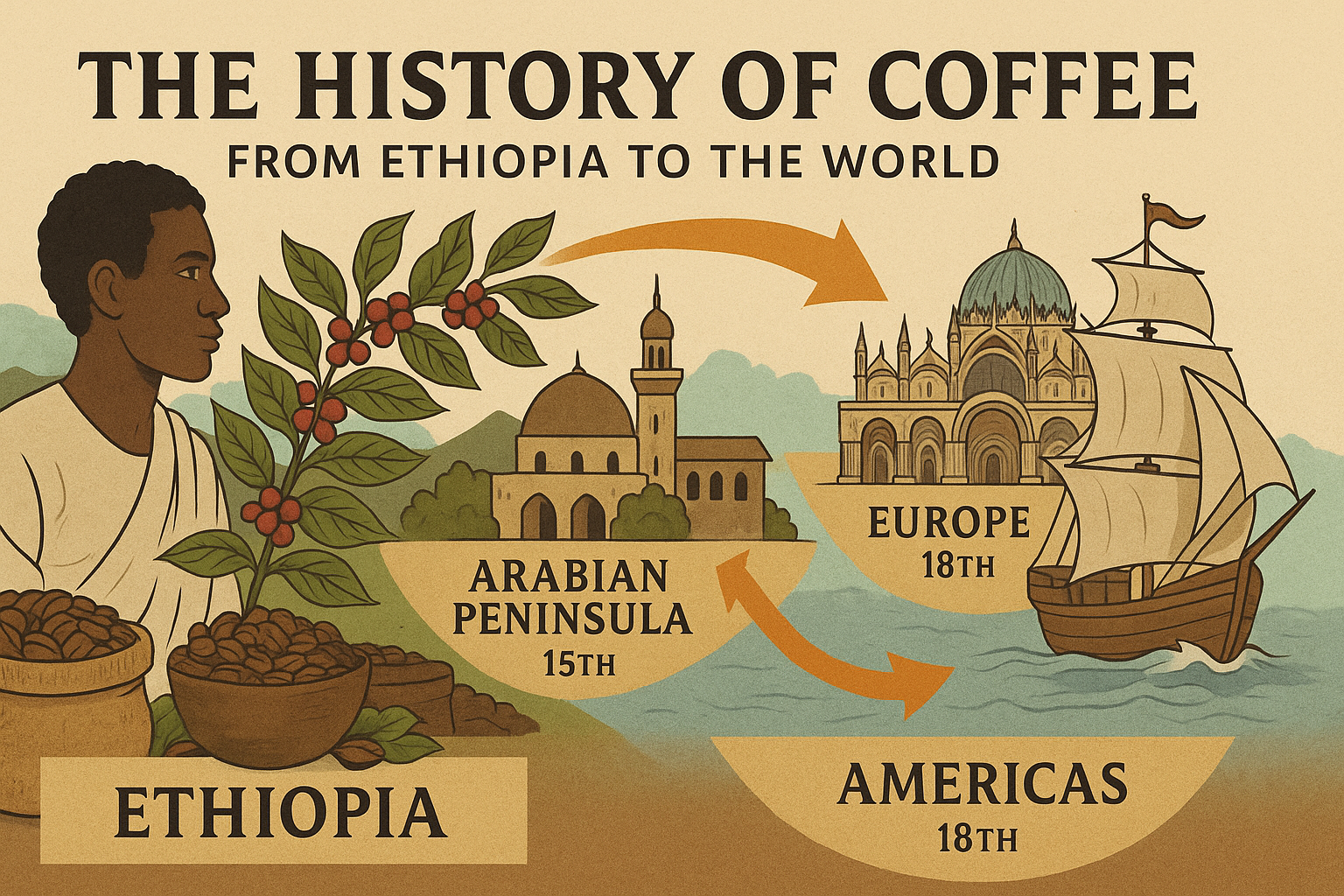Coffee is one of the most beloved beverages across the globe, enjoyed by millions every day for its rich flavor, energizing effects, and social allure. But how did this simple bean become such a cultural and economic powerhouse? The history of coffee is a fascinating journey that begins in ancient Ethiopia and spans continents, empires, and centuries.
The Origins of Coffee in Ethiopia
According to popular legend, coffee was discovered by a goat herder named Kaldi in the Ethiopian region of Kaffa around the 9th century. Kaldi noticed that his goats became particularly energetic and lively after consuming the red berries from a certain shrub. Intrigued by this phenomenon, Kaldi shared his discovery with local monks.
The monks experimented with the berries by making a beverage and soon realized that the drink helped them stay awake and alert during long prayer sessions. Word of this energizing potion spread quickly throughout the region, laying the foundation for coffee’s journey beyond Ethiopia.
Coffee’s Journey to the Arab World
By the 15th century, coffee cultivation and trade had expanded to Yemen, where it became an integral part of Islamic culture. Sufi monks used coffee to sustain their nocturnal devotions, and the beverage gained popularity in cities such as Mecca and Medina.
The port city of Mocha (Al Mokha) in Yemen emerged as a major center for coffee trade, lending its name to the famous “mocha” coffee style known today. From Yemen, coffee spread across the Middle East, becoming a staple in Ottoman Turkey, Persia, and Egypt.
The Rise of Coffeehouses
As coffee’s popularity grew, so did the establishment of coffeehouses, known as qahveh khaneh in Persia. These establishments were not just places to enjoy a cup of coffee, but also hubs for intellectual exchange, entertainment, and social gatherings. Patrons engaged in lively discussions about politics, philosophy, and literature while enjoying their favorite brews.
By the 16th century, coffeehouses had become widespread in cities like Constantinople (modern-day Istanbul), Cairo, and Baghdad. They played a crucial role in shaping the social fabric of these societies, much as cafés do today.
Coffee Reaches Europe
Coffee arrived in Europe during the 17th century through the Venetian trade with the Ottoman Empire. Initially met with suspicion and even labeled as the “bitter invention of Satan,” coffee eventually won over European palates. Religious leaders, including Pope Clement VIII, are said to have approved of the drink after tasting it, helping to dispel negative perceptions.
The first coffeehouse in Europe opened in Venice in 1645, quickly followed by establishments in major cities like London, Paris, and Vienna. These European coffeehouses mirrored their Middle Eastern counterparts as centers for social and intellectual activity, frequented by artists, writers, and political thinkers.
Coffee in the New World
As European colonial powers expanded their empires, they sought to cultivate coffee in tropical climates outside of Arabia. The Dutch were among the first to successfully grow coffee in Java, Indonesia, in the late 1600s. The French introduced coffee to the Caribbean, while the Portuguese planted it in Brazil.
Brazil’s climate proved ideal for coffee cultivation, and by the 19th century, the country became the world’s largest producer of coffee—a position it still holds today. The widespread cultivation of coffee in the Americas transformed the beverage into a global commodity and had profound economic and social impacts.
The Global Coffee Industry Today
Today, coffee is a multibillion-dollar industry that influences economies, cultures, and daily routines worldwide. Countries such as Colombia, Ethiopia, Vietnam, and Brazil are leading producers, while specialty coffee shops and multinational chains like Starbucks have popularized the coffee culture across all continents.
Beyond its economic significance, coffee has become deeply embedded in global culture. From the traditional coffee ceremonies of Ethiopia to the sophisticated café culture of Paris, coffee continues to serve as a symbol of hospitality, creativity, and community.
Fun Facts About Coffee’s History
- The term “coffee” derives from the Arabic word qahwa, originally referring to a type of wine.
- The first coffeehouse in England, known as “The Angel,” opened in Oxford in 1650.
- Coffee was once banned in Mecca in the 16th century due to concerns that it encouraged radical thinking.
- Johann Sebastian Bach composed a humorous piece called the “Coffee Cantata,” celebrating the beverage’s popularity in 18th-century Germany.
Why Coffee’s History Matters
Understanding the history of coffee enriches our appreciation for this everyday beverage. Each cup we enjoy is a product of centuries of cultural exchange, agricultural innovation, and human ingenuity. As coffee continues to evolve, its rich legacy reminds us of the power of simple pleasures to shape societies and connect people across the world.
